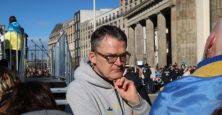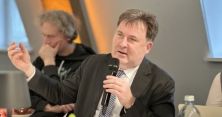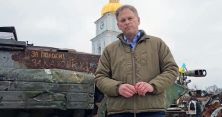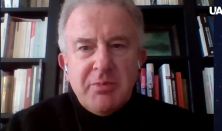Politicians and figures who already at this stage deny the possibility of Bundeswehr soldiers participating in ensuring compliance with the...
Vous n'êtes pas connecté
- English
- Français
- عربي
- Español
- Deutsch
- Português
- русский язык
- Català
- Italiano
- Nederlands, Vlaams
- Norsk
- فارسی
- বাংলা
- اردو
- Azərbaycan dili
- Bahasa Indonesia
- Հայերեն
- Ελληνικά
- Bosanski jezik
- українська мова
- Íslenska
- Türkmen, Түркмен
- Türkçe
- Shqip
- Eesti keel
- magyar
- Қазақ тілі
- Kalaallisut ; kalaallit oqaasii
- Lietuvių kalba
- Latviešu valoda
- македонски јазик
- Монгол
- Bahasa Melayu ; بهاس ملايو
- ဗမာစာ
- Slovenščina
- тоҷикӣ ; toğikī ; تاجیکی
- ไทย
- O'zbek ; Ўзбек ; أۇزبېك
- Tiếng Việt
- ភាសាខ្មែរ
- རྫོང་ཁ
- Soomaaliga ; af Soomaali
Rubriques :
 Maroc - EURASIAREVIEW.COM - A la une - 28/12/2024 00:50
Maroc - EURASIAREVIEW.COM - A la une - 28/12/2024 00:50
Is Peace Possible Today? – OpEd
In this Christmas season, with its connotations of peace and goodwill to all people, and the New Year, when one traditionally comes up with ‘resolutions’ for the year ahead, with the intention of compensating for mistakes made during the past year, and of initiating creative projects for the future, one has to ask: is all of this just Heideggerian ‘idle talk,’ or is peace a realistic possibility? This seems to be an easy question to answer. Despite President-elect Donald Trump’s repeated assurance that he would bring about an end to the war in Ukraine, it is by no means certain that he would be able to do that, not only because his enemies, both in the US and abroad, are heavily invested in keeping the war going at all costs, but also in light of the improbability that President Vladimir Putin of Russia would be a pushover when it comes to conditions for a peace agreement. Such an arrangement would suit Ukraine and NATO very well, insofar as it would provide them with the opportunity to rearm and recruit more soldiers for the likely recommencement of hostilities in the future – something that was done before (after the 2014-2015 Minsk agreements), as Angela Merkel and Francois Hollande have admitted. Besides, that this is not a novel tactic, and a disingenuous one to boot, should be evident, as Immanuel Kant knew in the 18th century already, when he wrote his famous essay on the conditions for ‘perpetual peace,’ on which I have elaborated before. I am thinking of a specific condition stated in this essay, in the very first of the ‘preliminary articles,’ which reads: ‘No treaty of peace shall be regarded as valid, if made with the secret reservation of material for a future war.’ Kant’s elaboration on this article shows that he was not sufficiently shortsighted to confuse peace with ‘a mere truce, a mere suspension of hostilities’ – possibly to gain valuable time for strengthening one’s military to recover after relinquishing some of their capabilities in battle. The article is therefore clearly aimed at preventing any ‘mental reservation’ of demands to be used as casus belli to be revitalised on a more auspicious occasion in the future. This is essentially what was done before, as acknowledged by Merkel and Hollande in the RT article linked above, which reported that ‘…former German chancellor Angela Merkel [who] described the Minsk accords in December [2014/2015] as ‘an attempt to give Ukraine time’ to build up its armed forces.’ That Vladimir Putin is not as ingenuous as to fall for such a ruse again – in the guise of the imposition of a temporary ‘freeze’ on military activities in Ukraine – is obvious, however, where RT reports that: Moscow has repeatedly ruled out freezing the conflict, stressing that all the goals of its military operation, including Ukraine’s neutrality, demilitarization and denazification, must be met. Russian President Vladimir Putin said this summer that Moscow would immediately declare a ceasefire and start peace talks once Kiev withdraws troops from all Russian territories, including the Donetsk and Lugansk republics, and Kherson and Zaporozhye regions. Furthermore, the prospects of peace are bedevilled by the non-military actions of NATO against Russia. This is amply demonstrated by the recent murder of Russian General Igor Kirillov and his aide, Major Ilya Polikarpov, by means of a remotely controlled explosive device outside of Kirillov’s Moscow apartment. This is bound to aggravate, rather than ameliorate, the conflict, given that it is not part of conventional military operations. The reasons for NATO resorting to such terrorist actions become clearer where Strategic Culture Foundation reports, in a manner that one would not find in any mainstream news outlets, that: Since 2017, Kirillov served as the Chief of Russia’s Radiological, Chemical and Biological Defense Forces. He was assigned to protect the Russian nation from weapons of mass destruction. Since Russia launched its special military operation in Ukraine to neutralize NATO-backed aggression, Kirillov’s team of investigators uncovered an alleged network of bioweapons laboratories in Ukraine run by the Pentagon. The Russian allegations appeared to be based on intercepted classified U.S. documents that confirmed the operation of bioweapons labs. Kirillov’s presentations and detailed reports caused international alarm about sinister Pentagon involvement in producing biological weapons of mass destruction. According to the Russian investigations, the bioweapons programs were authorized by the Obama and Biden administrations. The programs also involved major U.S. pharmaceutical, engineering and financial companies in a clandestine operation. For the United States, this controversial work by Kirillov and his team was a source of huge embarrassment, although the Western media brusquely dismissed it as ‘Kremlin disinformation.’ It purportedly exposed Washington as being implicated in a systematic bioterrorism project facilitated by a NeoNazi regime that believes in the genocidal destruction of Russia – as its Third Reich forebears did. The discovery of an alleged U.S. bioweapons industry in Ukraine made Lt. Gen. Kirillov a priority target. Former CIA analyst Larry Johnson opines that it was this background that resulted in his murder. Other commentators have claimed that the assassination was aimed at killing the truth about the alleged U.S. bioweapons program. Then, of course, apart from Ukraine there is the situation in and around Syria, which has changed fundamentally (compared to what had existed there before), in a very short time, when Islamist ‘terrorists’ recently carried out a Blitzkrieg, ousting Bashar al-Assad and imposing Islamic rule. With Assad having been given asylum in Russia, the previously secular Islamic Syria – where Jews, Muslims, and Christians co-existed in relative peace – seems to be gone forever, and rather than improving the prospects of peace in the region, it seems to be the other way around, as former weapons inspector Scott Ritter explains in conversation with Clayton Morris. The gist of Ritter’s explanation of the geopolitical implications of the whirlwind regime change in Syria, if I understand him correctly, is that it has been a major blow to the ‘axis of resistance’ (of Iran, Hamas, and Hezbollah) by the Israel-American alliance in the region, insofar as Syria used to provide a lifeline of sorts to Hezbollah, located in Lebanon (and Hamas, in Gaza). That no longer exists, leaving the door wide open for both Israel and Turkey – which have been major backers of the Jihadist takeover of Syria – to pursue expansionist goals, with the probable aim of occupying, and possibly incorporating, parts of the former Syria into their own territory. The upshot of all of this as far as prospects of peace in the region are concerned is anything but reassuring, even if one ignores the ongoing conflict in Gaza – which, according to Ritter, has been largely ignored by the world since the military incursion into and conquest of Syria began. What he has in mind is the position of Iran, which is much better armed than most people seem to think, and which is very close to being able to produce nuclear weapons. This, Ritter believes, is what creates the alarming possibility of a ‘pre-emptive’ strike against Iran by the US, and given the unpredictability of the Biden regime – specifically of Anthony Blinken – in this regard, he is not willing to rule something like this out. However, he does believe that, once President-elect Donald Trump is in the White House, the latter would probably pursue a diplomatic resolution regarding Iran’s capability of becoming a nuclear power (parallel to the hands-on diplomacy that Trump practiced with Kim Jong-Un of North Korea). In light of the information outlined above, together with relevant evidence, one would be forgiven for being pessimistic about Kant’s hope, more than two centuries ago, for an ‘everlasting peace’ among nations (discussed at length in the article linked earlier) sometime in the future. Given the current events of a bellicose nature, discussed above, this is undeniable, and when one scrutinises the three ‘Definitive Articles’ identified by Kant in his peace essay, which would (ideally) provide a foundation on which to build ‘lasting peace,’ and not only a ‘termination of hostilities,’ this is only reinforced. These articles are, first, ‘The civil constitution of all states shall be republican,’ which articulates Kant’s belief, that it is the ‘only constitution which has its origin in the idea of the original contract, upon which the lawful legislation of every nation must be based.’ This constitution is in accordance with the liberty of citizens as human beings; and such freedom depends on shared legislation, and on their equality as citizens. The reason why it is, for Kant, the only constitution that can prepare the way to ‘perpetual peace,’ is that it requires the agreement of citizens before the ‘bad business’ of war can be initiated. Although it is the case, today, that most countries in the world are ‘republican’ in the sense of being representative, instead of ‘direct’ democracies, evidence suggests that, in allowing financial, material, and advisory assistance to Ukraine in the current conflict, the US has circumvented the principle that, as representatives of the American people, Congress has the sole right to declare war against a perceived enemy. This has not been done. Moreover, because American taxpayer funds and military personnel have been utilised in the Ukrainian military conflict, the American public has arguably been implicated in it. The second ‘definitive article,’ namely, ‘The law of nations shall be founded on a federation of free states,’ is essential for enduring peace because such a federation, where states would be subject to federal laws, is comparable to a state with a republican constitution. Nonetheless, when comparing current events in Ukraine and Syria with Kant’s expectations regarding the role of a ‘federation of states’ in the promotion of peace, the UN Preamble rings somewhat hollow. The third of the ‘definitive articles’ named by Kant, to wit, ‘The rights of men, as citizens of the world, shall be limited to conditions of universal hospitality’ is virtually unthinkable today. Needless to spell out, ‘universal hospitality’ does not obtain in the world of the 21st century; on the contrary, virtually everywhere that one travels, you are subjected to stringent requirements before entry into a ‘foreign’ country is granted. Therefore, judging contemporary events related to the ongoing military conflict in Ukraine and Syria against Kant’s requirements for lasting peace, it is obvious that the present seems to be further than ever from the possible actualisation of such ‘perpetual’ peace. This article was published at Brownstone Institute
Articles similaires
Ukraine’s European and Euro-Atlantic integration should be simultaneous – German expert
Partners should assist Ukraine in meeting the criteria for EU membership and provide reliable security guarantees, enabling the country to join not...
Former UK Defence Secretary Advocates for Ukraine’s NATO Membership and UK’s Role in Macron’s Initiative
Former UK Defence Secretary Grant Shapps has voiced support for inviting Ukraine to join NATO and for London's participation in a potential allied...
Europe Isn’t The Real Threat To Ukraine Peace But UK – OpEd
The Biden Administration has not given up on Ukraine war. A meeting of the Ramstein Format Meeting is scheduled to take place in Germany on...
Is The World Ending War, Despite Ukraine? – OpEd
By Jonathan Power An ugly cloud of pessimism hands over many parts of the world. War that seemed to be in retreat, has returned with a vengeance...
Zelenskyy Says Trump Could Be ‘Decisive’ In Ending War
(RFE/RL) -- Ukrainian President Volodymyr Zelenskiy said in a televised interview broadcast on January 2 that U.S. President-elect Donald Trump's...
The Fall Of Syria’s Assad Regime Is Bad News For Libya – Analysis
Russia’s apparent fast-tracking of plans to establish a military hub in Libya could worsen that country’s protracted conflict. By Peter...
Fall Of Syrian Regime And Regional Implications – Analysis
By Amb. Assoc. Prof. Dr. Arben P. Cici While the world's eyes and attention were focused on the new Trump administration, the consequences of...
Nicolas Tenzer – negotiating for Ukraine without Ukraine is a disgrace!
North-Korean soldiers - why Russia is using them after all. Say the ICC travel ban is lifted and Putin travels to Switzerland to meet Trump - what...
Ukraine Can Expect Further US Aid Offers Before Biden Leaves Office, White House Says
(RFE/RL) -- Ukraine can expect more announcements in coming days about additional U.S. security assistance, a White House spokesman said as...
Les derniers communiqués
-
Adobe Brings Conversational AI to Trillions of PDFs with the New AI Assistant in Reader and Acrobat
Adobe - 21/02/2024
-
Laura Frigenti takes the Helm as Chief Executive Officer of the Global Partnership for Education
Global Partnership for Education - 05/12/2022



